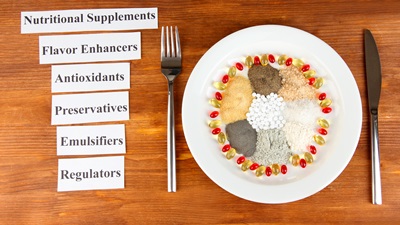
Approximately 80% of the foods we consume today are refined and chemically altered.
Food additives are not natural flavouring, spices, or seasonings. The Food and Drug Administration (FDA) in the United States allows more than 15,000 food and chemical additives into their food supply. In fact, the average North American consumes 10-15 pounds of additives per year. Food additives make the food more pleasing to the eyes and help to lengthen their shelf life, but at what cost? Food additives have been linked to diseases and allergies.
7 Food Additives To Avoid
1. Aspartame:
Equal and NutraSweet are the actual marketed names for aspartame. Aspartame enhances the taste of sweeteners and is about 200 times sweeter than sucrose.
A molecule of aspartame consists of two amino acids (phenylalanine and aspartic acid) linked by a molecule of methanol—the alcohol found in antifreeze.
These components break down in your body to form formaldehyde, then to formic acid, both of these are poisons.
These have been linked to Parkinson’s, ALS, multiple sclerosis, and adult-onset diabetes. Do you want these food additives on your kitchen table?
2. BHA:
Butylated hydroxyanisole is used as a preservative in baked goods, candy, chewing gum, breakfast cereal, dry mixes for cakes, and ice cream. BHA has been linked to many behavioral problems.
3. BHT:
Butylated hydroxytoluene retards rancidity in frozen and fresh pork sausage and freeze dried meats. It is also the base product for chewing gum. Allergic reactions and enlargement of the liver are side effects from BHT.
4. Caffeine:
Caffeine is a stimulant and is addictive. Consuming large amounts of caffeine over a long period of time can have toxic effects on the body and can affect blood sugar release, the liver and central nervous system.
Caffeine can cause irregular heartbeats, insomnia and irritability. Caffeine is an ingredient in coffee, tea, soft drinks, and chocolate.
There are some mixed reports on the benefits and harms of caffeine, so children and pregnant women should definitely stay away and you can read more here to learn more about caffeine.
5. Nitrites and Nitrates:
Nitrates are natural occurring chemicals, and are used to preserve meat, and to improve flavor. In large amounts, they can be toxic.
Years ago, manufacturers used to use them in baby food, but after knowledge came out about the risks, they withdrew nitrites in the baby food. Yet, you can still find nitrates in many other foods! This is definitely a food additive to avoid.
6. Sulfites:
Sulfites are used to reduce and prevent discoloration of vegetables and fruits. They are a preservative and bleaching agent and they are found in sliced fruit, beer, and wine.
Reactions to sulphites may include hives, dizziness, and difficulty breathing.
7. Sugar:
Sugar is one of the most damaging and destructive items in our diets. Sugar in any form is quickly absorbed into the blood stream. It has no nutritional value and is addictive.
North Americans consume an average of 150 pounds of sugar a year. Upon digestion of sugar, the immune system is depressed and this can predispose people to infections and allergies.
It is no wonder children come down with the flu and colds after Halloween and Valentine’s Day.
These food additives are made to make food taste better and make it more appealing to eat, but they come with a heavy price: disease, infections, and so much more. Read labels carefully to avoid these food additives.
Related:













